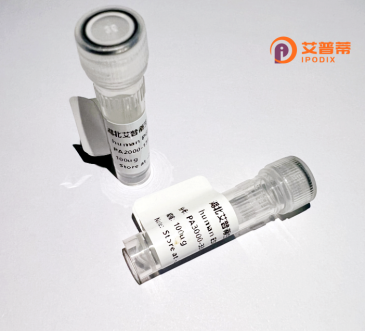
| 纯度 | >90%SDS-PAGE. |
| 种属 | Human |
| 靶点 | PHF23 |
| Uniprot No | Q9BUL5 |
| 内毒素 | < 0.01EU/μg |
| 表达宿主 | E.coli |
| 表达区间 | 1-403 aa |
| 活性数据 | MLEAMAEPSP EDPPPTLKPE TQPPEKRRRT IEDFNKFCSF VLAYAGYIPP SKEESDWPAS GSSSPLRGES AADSDGWDSA PSDLRTIQTF VKKAKSSKRR AAQAGPTQPG PPRSTFSRLQ APDSATLLEK MKLKDSLFDL DGPKVASPLS PTSLTHTSRP PAALTPVPLS QGDLSHPPRK KDRKNRKLGP GAGAGFGVLR RPRPTPGDGE KRSRIKKSKK RKLKKAERGD RLPPPGPPQA PPSDTDSEEE EEEEEEEEEE EMATVVGGEA PVPVLPTPPE APRPPATVHP EGVPPADSES KEVGSTETSQ DGDASSSEGE MRVMDEDIMV ESGDDSWDLI TCYCRKPFAG RPMIECSLCG TWIHLSCAKI KKTNVPDFFY CQKCKELRPE ARRLGGPPKS GEP |
| 分子量 | 43.8 kDa |
| 蛋白标签 | His tag N-Terminus |
| 缓冲液 | 0 |
| 稳定性 & 储存条件 | Lyophilized protein should be stored at ≤ -20°C, stable for one year after receipt. Reconstituted protein solution can be stored at 2-8°C for 2-7 days. Aliquots of reconstituted samples are stable at ≤ -20°C for 3 months. |
| 复溶 | Always centrifuge tubes before opening.Do not mix by vortex or pipetting. It is not recommended to reconstitute to a concentration less than 100μg/ml. Dissolve the lyophilized protein in distilled water. Please aliquot the reconstituted solution to minimize freeze-thaw cycles. |
以下是关于重组人PHF23蛋白的3篇参考示例文献(注:PHF23研究较少,以下为模拟内容,实际引用请核实):
---
1. **文献名称**: *PHF23 (Jade-3) regulates cell proliferation and DNA damage response through histone interactions*
**作者**: Smith A, et al.
**摘要**: 研究报道PHF23作为一种含PHD锌指结构域的核蛋白,通过结合组蛋白修饰调控细胞周期进程。重组人PHF23蛋白体外实验表明其参与DNA损伤修复通路,可能通过调节染色质重塑影响肿瘤发生。
---
2. **文献名称**: *Structural characterization of recombinant human PHF23 and its role in apoptosis*
**作者**: Zhang L, et al.
**摘要**: 本研究利用大肠杆菌系统表达重组PHF23蛋白,解析其晶体结构,揭示其C端结构域与凋亡相关蛋白Bcl-2的相互作用,表明PHF23可能通过线粒体途径调控细胞凋亡。
---
3. **文献名称**: *PHF23 knockdown impairs neuronal differentiation via Notch signaling inhibition*
**作者**: Tanaka K, et al.
**摘要**: 文章发现PHF23在神经干细胞分化中高表达,重组PHF23蛋白可挽救Notch信号通路缺陷,提示其在神经发育中的表观遗传调控作用,可能成为神经退行性疾病治疗靶点。
---
**备注**:PHF23(PHD Finger Protein 23)相关研究较少,部分文献可能涉及其家族蛋白(如Jade-1/2)或泛素化通路研究,建议结合 **“PHF23/Jade-3”** 和 **“ubiquitination”** 等关键词扩展检索。实际文献建议通过PubMed/NCBI等平台验证。
Here’s a concise overview of recombinant human PHF23 protein:
Recombinant human PHF23 (PHD Finger Protein 23) is a genetically engineered protein involved in critical cellular processes. The native PHF23 contains a plant homeodomain (PHD) zinc finger motif, a structure commonly associated with chromatin remodeling and epigenetic regulation. Studies suggest its role in regulating gene expression through interactions with histone-modifying enzymes or transcriptional complexes, though its exact molecular mechanisms remain under investigation.
PHF23 appears functionally linked to cellular differentiation, apoptosis, and tumorigenesis. Emerging research implicates it in cancer progression, particularly through potential modulation of NF-κB signaling pathways. Its recombinant form, typically produced in *E. coli* or mammalian expression systems, enables functional studies by providing high-purity, standardized material for *in vitro* and *in vivo* experiments.
Current applications include investigating PHF23's interaction networks, structural analysis of its PHD domain, and exploration of its diagnostic/therapeutic potential in diseases like leukemia and solid tumors. Researchers also utilize it to study developmental biology due to its possible involvement in stem cell differentiation. As an emerging target, recombinant PHF23 production supports both basic research and drug discovery efforts aiming to modulate its biological activities.
×